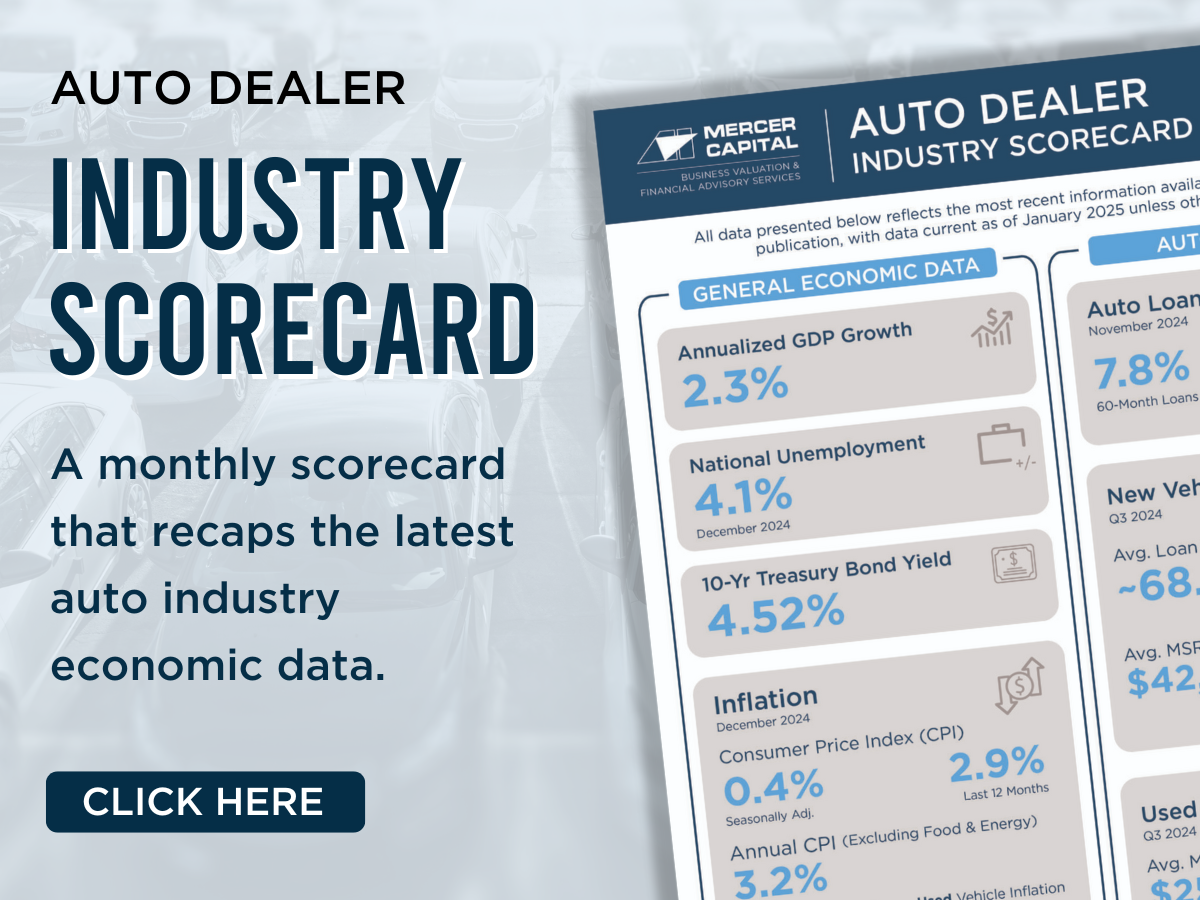Rivian Automotive has been in the news a lot recently given its eye-popping IPO. Ford has invested in Rivian and until recently was planning to jointly develop an EV. In this week’s post, we feature a recently published piece from our Family Business Director blog about Ford’s decision to invest in Rivian from Ford’s perspective.
Category
Valuation Issues
NADA Is Busy Working on Capitol Hill on Behalf of Auto Dealers
In last week’s blog, we wrote about attending some of the Tennessee Automotive Association meetings and explored the buy/sell considerations discussed there.
This week, we discuss another highlighted topic: the federal legislation that NADA is prioritizing and how that legislation could impact your dealership’s operations.
Tax/Estate Planning Cheat Sheet for Auto Dealers
Winds of Change?
Benjamin Franklin famously said that the only things certain in this life are death and taxes. While both may be certain, taxes are always subject to change.
In this post, we focus on four particular proposals from the Build Back Better Act that impact estate planning and business valuations for auto dealers: 1) Estate Tax / Lifetime Exclusion; 2) Corporate Income Tax Rates; 3) Capital Gains Rates; and 4) Valuation Discounts for Passive Assets.
Q2 2021 Earnings Calls
Public Auto Dealers Weigh Record Profits, Days’ Supply, and Capital Allocation
Second quarter earnings calls across the group of public auto dealers began with similar themes: record profits and earnings, record Gross Profits Per Unit (GPU) on new and used vehicles, and tightening inventory conditions. This week we take a deeper dive into some of those themes including remarks from management, related to expectations moving forward.
First Half 2021 Review of the Auto Dealer Industry
What Are Key Statistics Saying?
As we enter into the second half of 2021, first half statistics are being released and second quarter earnings calls are on the horizon for the public auto companies. We’ve all read the headlines of the auto dealer industry in 2021: heightened profitability, historic gross profits per unit and soaring retail sales prices for new and used vehicles, and inventory shortages and challenges caused by plant shutdowns and the microchip shortage. What are some of the key industry statistics saying about the current and future health of the auto dealer industry? Have they peaked, are they continuing to increase or beginning to decline, and/or how long will the current conditions hold? In this post we attempt to answer these questions.
Formula Clauses for Auto Dealerships
Pros and Cons of Using Formula Clauses in Buy-Sell Agreements
A formula clause explains how a business will be valued, usually as part of a buy-sell agreement, employment agreement, transfer of interests under certain circumstances, or other agreement entered between owners of a company. In this post, we explain formula clauses, when they are used, why they are used, and why we ultimately recommend they not be used.
Whitepaper: Understand the Value of Your Auto Dealership
In this whitepaper, we break down the value drivers of a dealership, discuss when you might need a formal valuation, introduce the valuation methodologies used by professional business appraisers, and go into some depth about topics such as dealer financial statements and normalizing adjustments to the balance sheet and income statement.
Valuation and M&A Trends in the Auto Dealer Industry
Full Speed Ahead or Partly Cloudy?
A few weeks ago, I sat down with Kevin Nill of Haig Partners to discuss trends in the auto dealer industry and the release of their Fourth Quarter 2020 Haig Report. Specifically, I wanted to focus on the unique conditions impacting the industry, and also the changing methodology that buyers are utilizing to assess dealership values. Haig Partners is a leading investment banking firm that focuses on buy/sell transactions in the auto dealer industry, along with other transportation segments. As readers in this space are familiar, Haig Partners also publishes Blue Sky multiples for various auto manufacturers based on their observations and data from participating in transactions in this industry.
Q1 2021 Earnings Calls
Improved Profitability, Online Tools and Market Share, and High Valuations
Stimulus supported demand for vehicles and significant chip-related supply disruptions have improved profitability while public auto dealers also see fixed operations improving.
Dealership Working Capital
A Cautionary Tale Against Rigid Comparisons
Most transactions involving auto dealerships are structured as asset sales, so dealer principals may take this mindset when considering a business valuation. Generally, the assets acquired by a buyer include new vehicles, used vehicles, parts, fixed assets, and the blue sky or intangible value of the franchise. However, the inventory (predominantly new and used vehicles) is typically financed 100% through short-term lines of credit referred to as floor plan. If the largest portion of current assets are offset with corresponding short-term debt and other working capital items such as cash are not involved in a dealership transaction, a dealer might wonder why does working capital matter?
Valuation Implications of a 28% Corporate Tax Rate on Blue Sky Multiples
Will Dealerships Become Less Valuable if Tax Rates Rise?
In the early stages of the Biden administration, much of the tax-related discussion surrounding the auto industry has been related to credits for electric vehicle manufacturing and investment in EV infrastructure. In this post, we discuss the valuation implications for auto dealers of the proposed increase in the federal corporate tax rate from 21% to 28%.
Six Events That Trigger the Need for a Valuation
Auto dealers, like most business owners, are focused on many aspects of their business: daily operations, strategic vision, competition, industry conditions, the state of the economy, etc. It is less common for auto dealers to be concerned if/when their business might need to be valued. Often, they are made aware of the need for these services by their trusted advisors including attorneys, financial planners, accountants, etc.
What are common events that trigger the need for a valuation for an auto dealership?
Seven Factors of a Highly Effective Buy-Sell Agreement for Auto Dealerships
A Roadmap to the Valuation Process
In this post, we will cover seven factors of a highly effective buy-sell agreement for auto dealerships and also touch on several other considerations.
Valuation Considerations for Auto Dealership Entities with Multiple Franchises
The valuation of an auto dealership can be a challenging and complicated process. The structure of most auto dealerships consists of an entity holding the actual dealership operations and a separate entity owning the real estate and building. Often the latter is a related party entity that charges the dealership rent for use of the land and building. Occasionally, the real estate and the dealership operations are contained in the same entity.
We are all used to the local dealership in our town: Bill Jones Honda, Steve Smith Chevrolet. But what about the larger auto groups that have multiple franchises organized in the same entity? How are they valued and what special valuation considerations apply to them?
Measuring Up: Evaluating Your Auto Dealership Against Benchmark Metrics
In a strange year of oddities, 2020 has all of us constantly evaluating life’s basic truths. Market conditions vary drastically across all industries and even geographically within the same industry due to local government restrictions. It’s critical for auto dealers to continually analyze all aspects of their business and be ready to capitalize on industry trends. We previously discussed the use of the NADA dealership profiles as a useful tool to examine timely monthly data based on averages or dealership type. Three specific metrics in the data have reached their highest level since the data was originally published in 2012: new vehicle retail gross profit per unit, used vehicle retail gross profit per unit, and used-to-new vehicle unit ratio.
Valuation Assumptions Influence Auto Dealer Valuation Conclusions
How to Understand the Reasonableness of Individual Assumptions and Conclusions
There are several life events (large and small) that require an owner of an auto dealership to seek a business valuation. Often the owner of the dealership and their advisors may only view a handful of business valuations during their careers. It is not unusual for the valuation conclusions of appraisers to differ significantly, with one significantly lower or higher than the other.
What is an owner or their advisor to think when significantly different valuation conclusions are present? The answer to the reasonableness of the conclusion lies in the reasonableness of the appraiser’s assumptions. However, valuation is more than “proving” that each and every assumption is reasonable. Valuation also involves proving the overall reasonableness of an appraiser’s conclusion.
GM and Nikola Partnership: What Went Wrong and Where Does it Stand?
A new trend has emerged as auto manufacturers are seeking out start-ups for their technology in a mutually beneficial relationship, perhaps best exemplified by GM and Nikola’s plan for a partnership. In this post, we look at the original deal, ensuing issues, and current plans. We will also look at what this trend could mean for dealerships going forward, and the importance of the valuation date.
Analyzing Sources of Peer Information for Auto Dealers
Data Drill Down
In our quarterly newsletters, we use various data sources to keep tabs on the auto dealer industry. This includes items like SAAR to gauge the health and activity of the industry in terms of volumes. In this post, we discuss other metrics that help us analyze the dealerships we’re engaged to value.
Take Advantage of Current Estate Planning Opportunities While You Can
While economic recovery is still uncertain as the pandemic continues on and new relief bills are on the ropes, there are other ways outside of the box for auto dealers to show resiliency during this time and plan for economic success going forward. This includes opportunities that exist in estate planning this fall for owners of assets in the auto dealer, and all, industries. Three converging factors have this fall shaping up to be the busiest estate planning season since 2012: potentially depressed valuation of assets and businesses, historically low interest rates, and uncertainty regarding the political administration going forward.
Whitepaper Release: Understand the Value of Your Auto Dealership
In this whitepaper, we break down the value drivers of a dealership, discuss when you might need a formal valuation, introduce the valuation methodologies used by professional business appraisers, and go into some depth about topics such as dealer financial statements and normalizing adjustments to the balance sheet and income statement.
Valuation and M&A Trends in the Auto Dealer Industry
Shifting Out of Neutral
For this week’s blog post, we sat down with Kevin Nill of Haig Partners to discuss trends in the auto dealer industry and the recent release of their First Quarter 2020 Haig Report. Haig Partners is a leading investment banking firm that focuses on buy/sell transactions in the auto dealer industry, along with other transportation segments. As readers in this space are familiar, Haig Partners also publishes Blue Sky multiples for each of the auto manufacturers based on their observations and data from participating in transactions in this industry.
How Proper Normalization Adjustments Contribute to a Better Finished Product
Trusting the Process
In previous posts, we discussed the valuation methodologies and the value drivers of an auto dealership valuation. The next step in the process is to normalize the financial statements.
Normalization adjustments take private company financials and adjust the balance sheet and income statement in order to view the company from the lens of a “public equivalent.” Adjustments are often interrelated; a change to the balance sheet frequently will affect the income statement.
In this week’s post, we highlight many of the typical normalization adjustments that must be considered in the valuation of an auto dealership.
Driving Value: Key Components of an Auto Dealership Valuation
Auto dealers, like most business owners, are likely always curious about what their dealership might be worth. While there are many times they may want to know, there are various life events that make them need to know the value such as a transaction (including buy-sell), litigation, divorce, wealth-transfer, etc. While valuations tend to be performed infrequently around these events, dealers can evaluate their business and improve its value by understanding and focusing on the value drivers of their auto dealership and addressing them on a consistent basis. So, what are some of the value drivers of an auto dealership?
Complex Valuation Issues in Auto Dealer Litigation
Solving the Puzzle
Litigation engagements are generally very complex, consisting of many moving parts. The analogy that comes to mind is the nostalgic game of Tetris. Like the game, many clients involved in auto dealer valuation disputes also experience anxiety and stress as problems begin to pile up.
We hope you never find yourself a party to a legal dispute; however, in this post, we offer words of wisdom based upon our experience working in these valuation-related disputes. We begin with seven topics, posed as questions, that have been points of contention or common issues that have arisen in recent litigation engagements. We’ve also added two questions to consider additional issues raised during the COVID-19 crisis.










